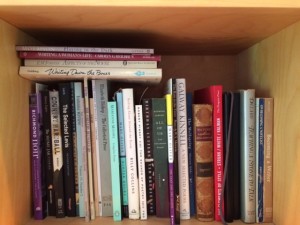In his Commencement speech at Dickinson College earlier this week, author Ian McEwan, spoke about the importance of free speech: "Let’s begin on a positive note: there is likely more free speech, free thought, free enquiry on earth now than at any previous moment in recorded history (even taking into account the golden age of the so-called ‘pagan’ philosophers). And you’ve come of age in a country where the enshrinement of free speech in the First Amendment is not an empty phrase, as it is in many constitutions, but a living reality."
He went on to say..."The words associated with Voltaire (more likely, his sentiments but not his actual phrasing) remain crucial and should never be forgotten: I disapprove of what you say, but I will defend to the death your right to say it."
His argument for free speech is strong, but for me the most compelling aspect centered around the role of novels to help us understand differing points of view—a necessity in a divided world.
 "In making your mind up on these issues," McEwan said, "I hope you’ll remember your time at Dickinson and the novels you may have read here. It would prompt you, I hope, in the direction of mental freedom. The novel as a literary form was born out of the Enlightenment, out of curiosity about and respect for the individual. Its traditions impel it towards pluralism, openness, a sympathetic desire to inhabit the minds of others. There is no man, woman or child, on earth whose mind the novel cannot reconstruct. Totalitarian systems are right with regard to their narrow interests when they lock up novelists. The novel is, or can be, the ultimate expression of free speech."
"In making your mind up on these issues," McEwan said, "I hope you’ll remember your time at Dickinson and the novels you may have read here. It would prompt you, I hope, in the direction of mental freedom. The novel as a literary form was born out of the Enlightenment, out of curiosity about and respect for the individual. Its traditions impel it towards pluralism, openness, a sympathetic desire to inhabit the minds of others. There is no man, woman or child, on earth whose mind the novel cannot reconstruct. Totalitarian systems are right with regard to their narrow interests when they lock up novelists. The novel is, or can be, the ultimate expression of free speech."
In 2013, Scientific American reported that researchers at The New School had found evidence that literary fiction improves a reader’s capacity to understand what others are thinking and feeling:
"Literary fiction...focuses more on the psychology of characters and their relationships.... This genre prompts the reader to imagine the characters’ introspective dialogues. This psychological awareness carries over into the real world, which is full of complicated individuals whose inner lives are usually difficult to fathom. Although literary fiction tends to be more realistic than popular fiction, the characters disrupt reader expectations, undermining prejudices and stereotypes. They support and teach us values about social behavior, such as the importance of understanding those who are different from ourselves."
As I complete a third novel set partially in China during a distant time period, I am again reminded of the correlation between exercising the muscle of the imagination and an overall feeling of empathy, not just in the reader as he or she absorbs a novel, but in the writer who creates one. Compassion seems to be a natural bi-product of literary sharing: that delving inward that creates a bond with others.
I know my life is made richer in meaning, and more daring in action, because of the novels I have both read and written.
